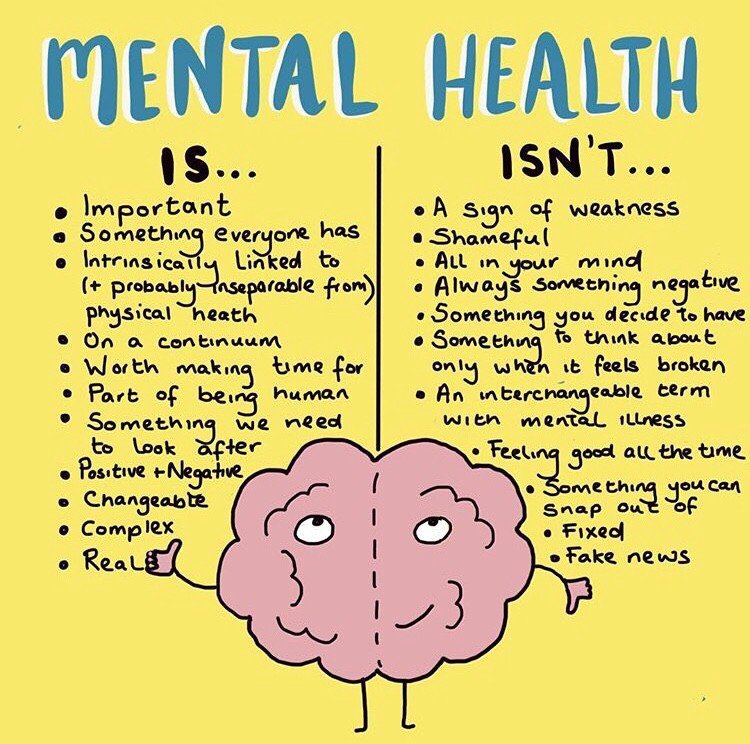Mental Health
Mental Health
Your mental health is important no matter what stage of life you are in. Mental health is a combination of one’s emotional, psychological, and social well-being. The state of your mental health will determine how stress and anxiety is handled, how you treat others, and decision-making. The factors that contribute to mental well–being include biological factors, family history with mental health problems, and life experiences.
Ways to Maintain Positive Mental Health
Connecting with friends and family and talking to them about your feelings
Staying physically active
Getting enough sleep
Helping others
Eating well
Developing coping skills
Track gratitude and achievement with a journal
More experiences with nature
Take breaks
Early Warning Signs
Not sure if you or someone you know is living with mental health problems? Experiencing one or more of the following feelings or behaviors for longer than a 2-week period can be an early warning sign of a problem:
Eating or sleeping too much or too little
Pulling away from people and usual activities
Having low or no energy
Feeling numb or like nothing matters
Having unexplained aches and pains
Feeling helpless or hopeless
Smoking, drinking, or using drugs more than usual
Feeling unusually confused, forgetful, on edge, angry, upset, worried, or scared
Yelling or fighting with family and friends
Experiencing severe mood swings that cause problems in relationships
Having persistent thoughts and memories you can't get out of your head
Hearing voices or believing things that are not true
Thinking of harming yourself or others
How to Get Mental Health Help:
If you or someone you know has a mental health problem, know that there are ways to get help and that you or they are not alone. People often don’t get the mental health services they need because they don’t know where to start. Talk to your primary care doctor or another health professional about mental health problems. Ask them to connect you with the right mental health services. If you do not have a health professional who is able to assist you, use these resources to find help for yourself, your friends, your family, or your students.
Immediate Help
If the situation is potentially life-threatening, get immediate emergency assistance by calling 911, available 24 hours a day.
If you or someone you know is suicidal or in emotional distress, contact the National Suicide Prevention Lifeline. Trained crisis workers are available to talk 24 hours a day, 7 days a week. Your confidential and toll-free call goes to the nearest crisis center in the Lifeline national network. These centers provide crisis counseling and mental health referrals.
—> 1-800-273-TALK (8255)
—> TTY: 1-800-799-4889
SAMHSA provides an extensive list of hotlines and locators to assist you with finding access to the care you need.
Communication
We believe that it is important to maintain good communication with both your family and friends. Are your friends on the same page as you on alcohol and drug use? Where does your family stand on these issues? Having conversation about drug use and alcohol use can help ease any worries you may have. It is also a good opportunity to learn from one another’s experiences. If your family and/or friends do not necessarily view drug and alcohol use as good nor bad, and perhaps regularly use them, do not feel discouraged and instead attempt to educate them on the harms associated with use. When you are having these conversations, remember to not accuse, argue, or moralize. Provide facts, be nonjudgmental, and offer support.
Treatment
What does drug and alcohol treatment look like?
Treatment for substance abuse disorder and addiction is very individualized. Everyone’s journey is unique to them. There is a full-range of evidenced-based treatment options. Your care team will create a specific plan for you based on your needs. Here are some of the types of treatment you will receive:
Medical Detox and Withdrawal Symptom Management: Medical supervision is necessary when stopping drug and alcohol use. It is one of the first steps to recovery.
Treatment Programs: Individuals with severe problems with drugs and alcohol may seek inpatient or outpatient programs. These programs typically include a combination of individual and group therapy, educational sessions, and self-help and peer support meetings.
Counseling: Counseling helps individuals develop coping strategies, especially with the presence of a mental health condition, or other distressing emotions.
Medication: Medication is usually prescribed to those with an underlying mental health condition, such as depression or anxiety. In other cases medication is prescribed to help reduce cravings, alleviate withdrawal symptoms, and help prevent relapse.
Self-care Tools: There are a variety of apps, articles, podcasts for managing depression, reducing stress and anxiety, and sleeping better. Find one that works for you.
Connections to Recovery Resources and Support: Others resources include 12-step programs and recovering housing options, which your care team can connect you to.
Inpatient and Outpatient Treatment:
At inpatient facilities, you stay there overnight and receive therapy during the day. It is a good option if outpatient treatment was not successful, you have other physical or mental problems, your home situation is not ideal, or do not live near outpatient treatment. The stay will depend on your recovery process, but may be around one to six weeks. Residential inpatient treatment is when you stay at the facility for months.
Outpatient treatment occurs in clinics, counselors' offices, or local health department offices. In standard outpatient treatment, you may have 1 or 2 therapy sessions a week. During these sessions, you will build the skills needed to handle everyday problems at school, work, and home. Outpatient treatment is a good option for those who cannot leave work, want to be close to family and friends, are able to stay away from drugs and alcohol, and when inpatient treatment is not affordable for you. It is important to have support from loved ones, reliable transportation, and a comfortable place to live.







